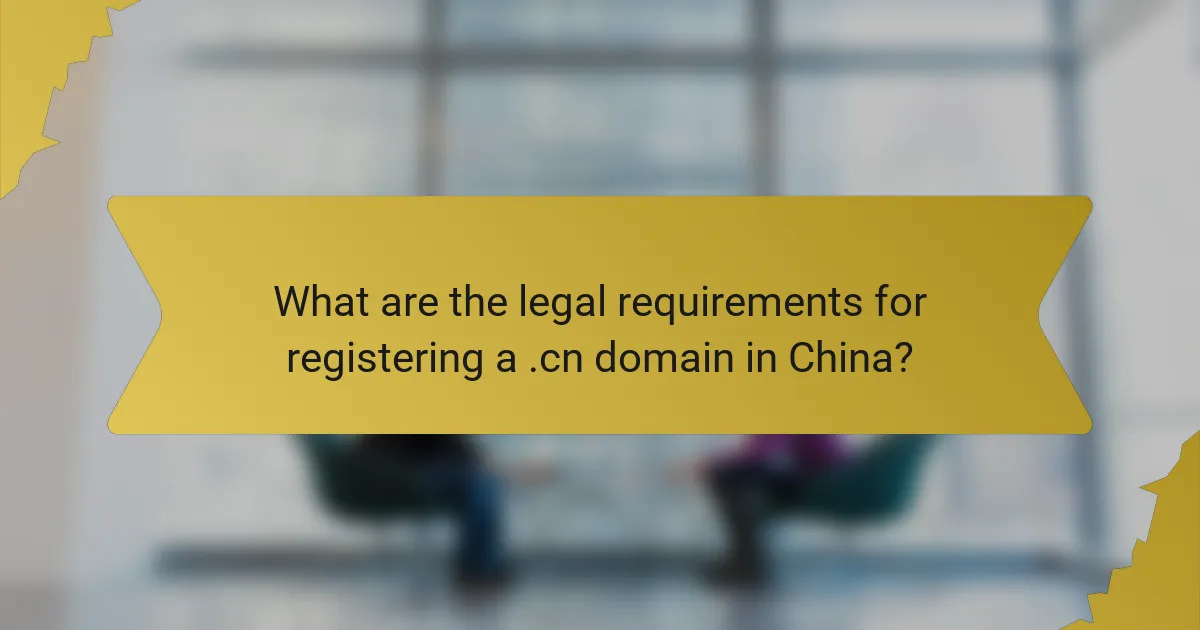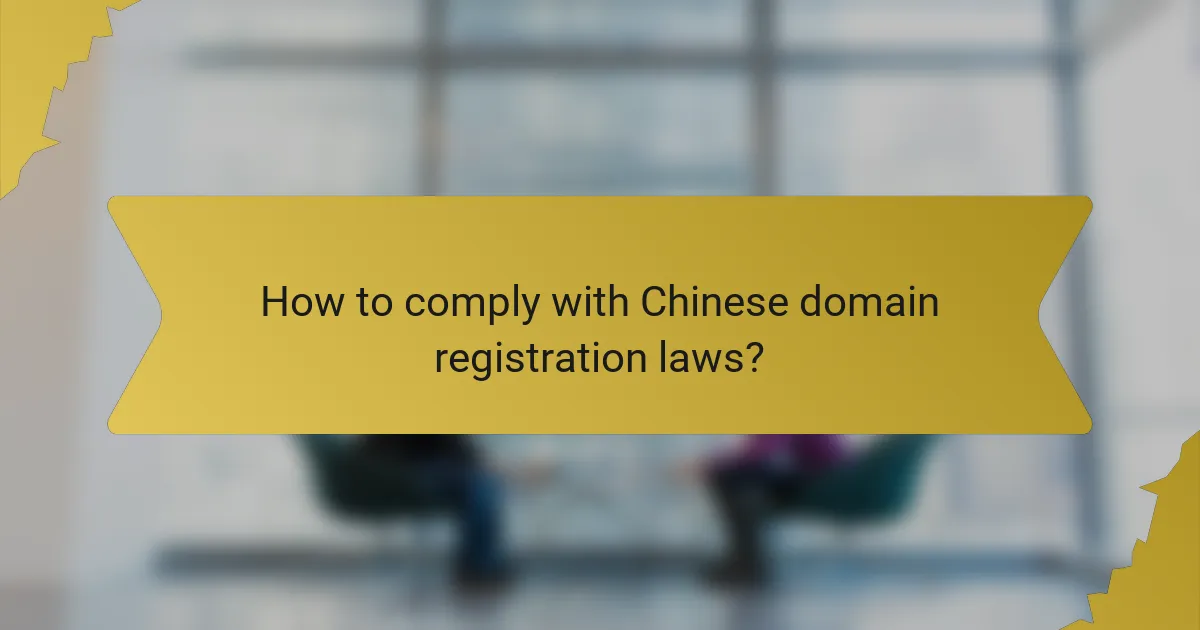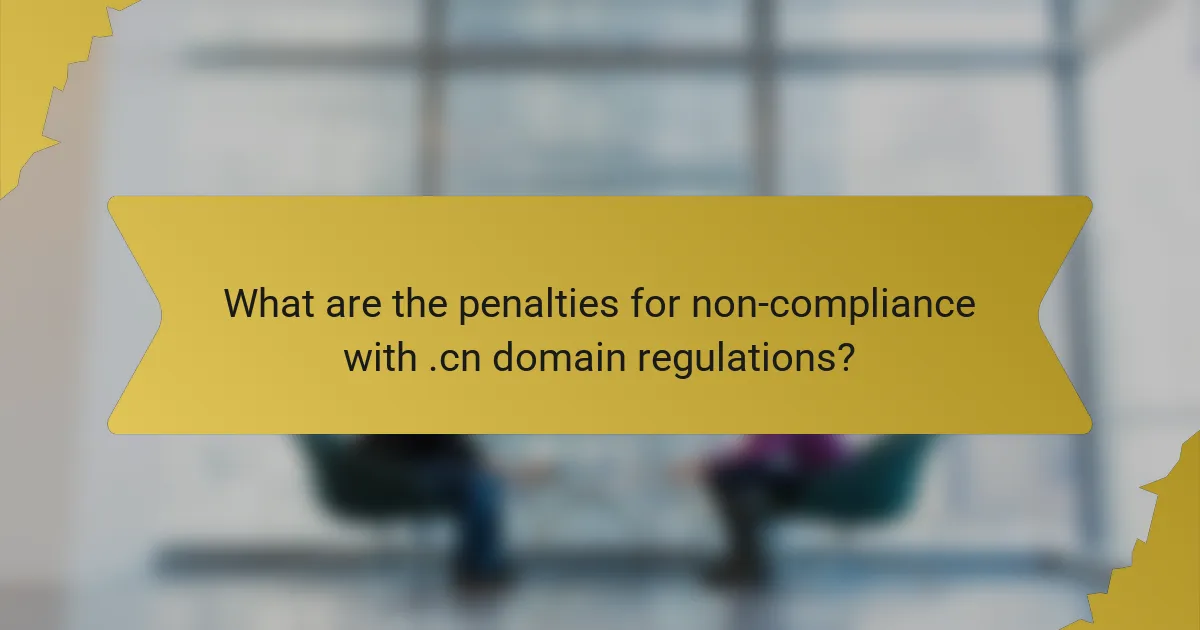Registering a .cn domain in China involves adhering to strict legal requirements, including having a local presence and submitting necessary documentation such as a business license and identity verification. Compliance with these regulations is essential to ensure that domain ownership is linked to legitimate entities within China. Failure to meet these requirements can result in severe penalties, including domain suspension and legal fines.

What are the legal requirements for registering a .cn domain in China?
To register a .cn domain in China, applicants must meet specific legal requirements, including having a local presence, submitting a business license, and completing an identity verification process. These regulations ensure that domain ownership is tied to entities or individuals with a legitimate connection to China.
Local presence requirement
China mandates that registrants of .cn domains have a local presence within the country. This means that either the individual or the organization must be based in China. Foreign entities can partner with a local representative or establish a local office to fulfill this requirement.
For individuals, this often involves providing a valid Chinese address. Businesses may need to demonstrate their operational status in China through documentation, such as a business registration certificate.
Business license submission
When applying for a .cn domain, businesses must submit a copy of their valid business license. This document serves as proof of the company’s legal status and operational capacity within China. The business license should be issued by the relevant local authority and must be current.
For foreign companies, a translated and notarized version of the business license may be required. Ensure that the license clearly states the business scope to avoid any issues during the registration process.
Identity verification process
The identity verification process for .cn domain registration involves confirming the identity of the registrant. This typically requires submitting a government-issued ID for individuals or a legal representative’s ID for businesses. The documentation must be clear and legible.
In some cases, additional verification steps may be necessary, such as providing a signed application form or undergoing a video verification process. It is crucial to follow the guidelines set by the registrar to ensure a smooth registration experience.

How to comply with Chinese domain registration laws?
To comply with Chinese domain registration laws, you must follow specific procedures and provide required documentation. Understanding local regulations is crucial for successful registration of a top-level domain in China.
Follow the registration process
The registration process for Chinese top-level domains typically involves selecting a registrar accredited by the China Internet Network Information Center (CNNIC). After choosing a registrar, you will need to fill out an application form and pay the registration fee, which can vary based on the domain type.
Once your application is submitted, it may take a few days to a couple of weeks for approval. Ensure that you provide accurate information to avoid delays or rejections.
Provide necessary documentation
When registering a domain in China, you will need to provide specific documentation, such as a copy of your business license if you are a company, or your identification if you are an individual. This documentation must be in Chinese, so consider using a translation service if necessary.
Additionally, some registrars may require a local contact or representative in China, particularly for foreign entities. Be prepared to submit proof of this arrangement if needed.
Understand local regulations
Local regulations governing domain registration in China include compliance with the country’s cybersecurity laws and content regulations. Domains must not host prohibited content, including anything that could be deemed politically sensitive or harmful to national security.
Familiarize yourself with the Internet Content Provider (ICP) license requirements, as this may be necessary for operating a website under your registered domain. Failure to comply with these regulations can result in fines or domain suspension.

What are the penalties for non-compliance with .cn domain regulations?
Penalties for non-compliance with .cn domain regulations can include domain suspension, legal fines, and loss of domain ownership. These consequences are enforced to ensure adherence to Chinese internet laws and regulations.
Domain suspension
Domain suspension occurs when a .cn domain fails to meet regulatory requirements. This can happen due to issues such as incorrect registration information or failure to provide necessary documentation. Suspended domains may become inactive, leading to potential loss of traffic and business opportunities.
To avoid suspension, ensure that all registration details are accurate and up-to-date. Regularly review compliance with the China Internet Network Information Center (CNNIC) guidelines.
Legal fines
Legal fines can be imposed on individuals or organizations that violate .cn domain regulations. The amount of these fines can vary significantly based on the severity of the violation and can range from hundreds to thousands of Chinese Yuan. Repeat offenders may face increased penalties.
To mitigate the risk of fines, familiarize yourself with the specific regulations governing .cn domains. Implementing compliance checks can help identify potential issues before they result in financial penalties.
Loss of domain ownership
Loss of domain ownership is a serious consequence of non-compliance with .cn regulations. If a domain is found to be in violation, the registrar may revoke ownership, transferring the domain back to the registry. This means the original owner could permanently lose their online presence.
To protect domain ownership, maintain compliance with all registration requirements and promptly address any notices from the registrar. Regular audits of domain status can help prevent ownership loss.

What are the differences between .cn and other Chinese TLDs?
The primary differences between .cn and other Chinese top-level domains (TLDs) lie in their registration requirements, target audiences, and usage limitations. While .cn is the official country code TLD for China, other TLDs like .com.cn and .net.cn cater to specific sectors or purposes.
Registration requirements comparison
To register a .cn domain, applicants must provide valid identification, such as a business license or personal ID, and comply with local regulations. In contrast, other TLDs like .com.cn may have less stringent requirements, often allowing foreign entities to register without a local presence.
For example, .com.cn typically requires a simple application process, while .cn domains necessitate more documentation to verify the registrant’s identity and legitimacy. This distinction can influence the choice of TLD based on the registrant’s needs.
Target audience distinctions
The .cn domain primarily targets businesses and individuals operating within China, emphasizing local presence and compliance. Other TLDs, such as .net.cn or .org.cn, often cater to specific sectors, like networking or non-profit organizations, attracting a more niche audience.
For instance, a tech startup may prefer .cn to establish credibility in the Chinese market, while a non-profit organization might opt for .org.cn to align with its mission. Understanding the target audience can guide the selection of the most appropriate TLD.
Usage limitations
For example, a .cn domain must adhere to the Chinese government’s regulations on censorship and online content, while a .com.cn domain may offer more flexibility in terms of content management. This difference can significantly impact how businesses operate online in China.

What are the prerequisites for obtaining a .中国 domain?
To obtain a .中国 domain, applicants must meet specific eligibility criteria and provide necessary documentation. This domain is primarily intended for entities operating within China, emphasizing local presence and compliance with Chinese regulations.
Eligibility criteria
Eligibility for a .中国 domain requires that the applicant be a legal entity registered in China, such as a corporation or organization. Individuals are generally not eligible unless they have a registered business in the country.
Additionally, the entity must have a valid business license and be able to demonstrate a connection to the Chinese market. This ensures that the domain is used for purposes relevant to the local audience.
Documentation needed
Applicants must submit several key documents to register a .中国 domain. These typically include a copy of the business license, a legal representative’s identification, and a completed application form.
In some cases, additional documentation may be required to verify the applicant’s connection to China, such as proof of address or operational permits. Ensuring all documents are accurate and up-to-date is crucial to avoid delays in the registration process.
Registration process overview
The registration process for a .中国 domain involves several steps. First, applicants must choose a domain name that complies with Chinese regulations and is available for registration.
Once the name is selected, the applicant submits the required documentation to an accredited registrar. After verification, the registrar will process the application, which can take a few days to a couple of weeks. It’s important to monitor the application status and respond promptly to any requests for additional information.

How do international businesses navigate Chinese domain laws?
International businesses can navigate Chinese domain laws by understanding local regulations, engaging with local partners, and utilizing legal advisory services. These steps are crucial for compliance and successful online presence in China.
Engage local partners
Collaborating with local partners is essential for international businesses looking to establish a domain in China. Local partners can provide insights into the regulatory landscape and help navigate the complexities of domain registration.
Consider forming partnerships with Chinese companies that have experience in domain management. This can streamline the process and reduce the risk of non-compliance with local laws.
Utilize legal advisory services
Hiring legal advisory services that specialize in Chinese internet law can significantly aid international businesses. These experts can offer guidance on the specific legal requirements for domain registration and maintenance in China.
Legal advisors can help identify potential pitfalls and ensure that all necessary documentation is correctly prepared, which is crucial for avoiding penalties or domain disputes.
Understand cultural nuances
Understanding cultural nuances is vital for successfully navigating Chinese domain laws. Awareness of local customs and business practices can enhance communication and foster better relationships with local stakeholders.
For example, being mindful of the importance of face-saving in negotiations can lead to more effective interactions with local partners and authorities. This cultural sensitivity can also improve the overall success of your business operations in China.
